
The Australian Kelpie, or simply Kelpie, is an Australian sheepdog capable of mustering and droving with little or no guidance. It is a medium-sized dog and comes in a variety of colours. The Kelpie has been exported throughout the world and is used to muster livestock, primarily sheep, cattle and goats.

The Border Collie is a British breed of herding dog of the collie type of medium size. It originates in the region of the Anglo-Scottish border, and descends from the traditional sheepdogs once found all over the British Isles. It is kept mostly as a working sheep-herding dog or as a companion animal. It competes with success in sheepdog trials. It has been claimed that it is the "most intelligent" breed of dog.

Schutzhund, currently known competitively as IGP and previously as IPO, is a dog sport that tests a dog's tracking, obedience, and protection skills, and evaluates if a dog has the appropriate traits and characteristics of a good working dog. It was developed in Germany in the early 1900s as a suitability test for German Shepherds, but soon became the model for training and evaluating all five of the German protection breeds, which included Boxer, Dobermann, Giant Schnauzer, and Rottweiler. Though any breed of dog can participate, today the sport is dominated by German Shepherds and the Belgian Shepherd breed. Dog owners and handlers participate in Schutzhund clubs as a group activity for training the dogs, and clubs sponsor trials to test the dogs and award titles. The best dogs can qualify to participate in national and international level championships.

The Shetland Sheepdog, also known as the Sheltie, is a breed of herding dog that originated in the Shetland Islands of Scotland. It was formally recognized by The Kennel Club in 1909. It was originally called the Shetland Collie, but this caused controversy amongst Rough Collie breeders of the time, so the name was changed. It is a small dog, clever, vocal, willing to please and trustworthy.
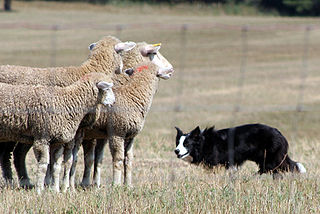
A sheepdog trial – also herding event, stock dog trial or simply dog trial — is a competition or test of the working abilities of dogs of herding breeds. It is a type of dog sport that emerged in the 1860s in New Zealand. By the 1870s regular trials were also being held in Australia and in the United Kingdom, and by the end of the twentieth century the sport had spread to many countries of the world. In competition, dogs demonstrate basic herding management skills assessed by the judge. These events are organised by international and national cynological and sports organisations and by associations of sheep- and cattle-breeders. Usually sheep are to be herded; other animals including ducks or cows may also be used.
Lure coursing is a sport for dogs that involves chasing a mechanically operated lure. Competition is typically limited to dogs of purebred sighthound breeds. The AKC has a pass/fail trial for all breeds called the Coursing Ability Test (CAT) and a timed 100 yard dash called Fast CAT where the dog's speed is converted to points.
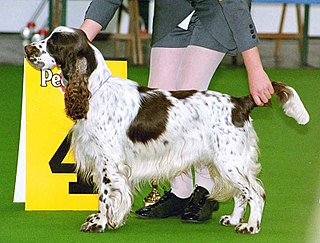
A dog show is an animal show, an event where dogs are exhibited. A conformation show, also referred to as a breed show, is a kind of dog show in which a judge, familiar with a specific dog breed, evaluates individual purebred dogs for how well the dogs conform to the established breed type for their breed, as described in a breed's individual breed standard.

A herding dog, also known as a stock dog, shepherd dog, sheep dog or working dog, is a type of dog that either has been trained in herding or belongs to breeds that are developed for herding.

The Rough Collie is a long-coated dog breed of medium to large size that, in its original form, was a type of collie used and bred for herding sheep in Scotland. More recent breeding has focused on the Collie as a show dog, and also companion. The breed specifications call for a distinctive long narrow tapered snout and tipped (semiprick) ears, so some dogs have their ears taped when young. Rough Collies generally come in shades of sable and white, blue merle, tri-colored, and colour-headed white.

Crufts is an international dog show held annually in the United Kingdom, first held in 1891. Organised and hosted by The Kennel Club, it is the largest show of its kind in the world.

The United Kennel Club (UKC) is a kennel club founded in 1898 in the United States. In contrast with the American Kennel Club, which is non-profit and which only clubs can join, the United Kennel Club is a profit-making corporation, open to individuals.
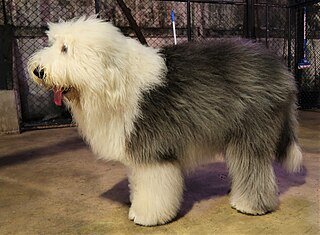
The Old English Sheepdog is a large breed of dog that emerged in England from early types of herding dog. Obsolete names for the breed include Shepherd's Dog and bob-tailed sheep-dog. The nickname Bob-tail originates from how dogs of the breed traditionally had their tails docked. Old English Sheepdogs can grow very long coats with fur covering the face and eyes and do not shed unless brushed.
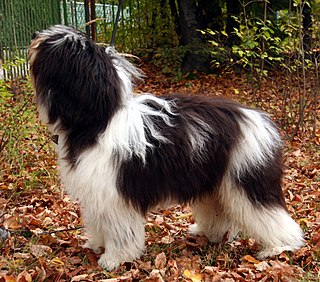
The Polish Lowland Sheepdog, is a medium-sized, shaggy-coated, sheep dog breed native to Poland.

An earthdog test or earthdog trial tests the working ability and instinct of the small, often short-legged terriers or Dachshunds. These dogs were bred to hunt vermin and other quarry which lived in underground dens. Earthdog den tests involve human-made tunnels that the dogs must navigate, while scenting a rat, "the quarry". The dog must follow the scent to the quarry and then "work" the quarry. Depending on the sanctioning organization, "working" means barking, scratching, staring, pawing, digging; any active behavior. The quarry is protected at all times by wooden bars across the end of the tunnel. The hunting encounter is controlled, and neither the dog nor the quarry are endangered by the activity.
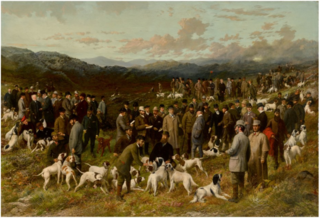
A field trial is a competitive event for gun dogs. Field trials are conducted for pointing dogs and setters, retrievers and spaniels, with each assessing the different types various working traits. In the United States, field trials are also conducted for basset hounds, beagles, and dachshunds.

International Sheep Dog Society (ISDS) was formed with the intention of increasing interest in securing the better management of livestock by improving the shepherd's dog to enable further business and community services of the Society. This remains the intention today. It seeks to achieve this by, amongst other things, managing the registration of dogs in its stud book.
Rally obedience is a dog sport based on obedience. It was originally devised by Charles L. "Bud" Kramer from the obedience practice of "doodling"—doing a variety of interesting warmup and freestyle exercises. The doodles were usually parts of obedience exercises that taught the skills and improved performance and accuracy.

The Portuguese Sheepdog is a medium-sized breed of dog of the herding dog type, and is one of the indigenous regional dogs of Portugal. The Portuguese name refers to Serra de Aires, a mountain near Montforte in the Alentejo region. The breed is nicknamed cão macaco for its furry face and lively attitude.

Championships are awarded to dogs who have passed through a process of selection at dog shows. Traditionally, a championship was received at a conformation show, but championships are now offered for dogs who have attained a high degree of perfection in other dog sports as well.

Dog agility is a dog sport in which a handler directs a dog through an obstacle course in a race for both time and accuracy. Dogs run off leash with no food or toys as incentives, and the handler can touch neither dog nor obstacles. The handler's controls are limited to voice, movement, and various body signals, requiring exceptional training of the animal and coordination of the handler.


















